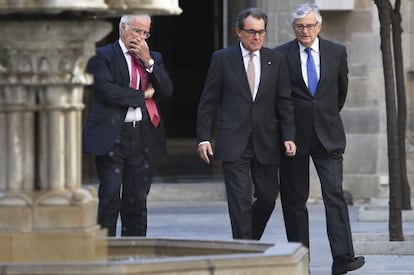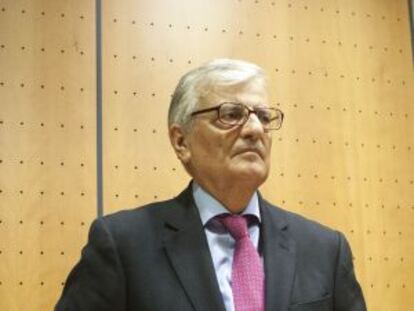Attorney general orders action against Catalan premier over vote
Move follows a week of hesitation over the legal basis for a complaint against Artur Mas

More than a week after Catalonia held its non-binding vote on self-rule for the northeastern region, Spain’s state prosecutor has decided to take legal action against Catalan premier Artur Mas for breaking the law.
But Attorney General Eduardo Torres-Dulce is facing opposition from state attorneys in Catalonia, who do not support such a move.
“The State Attorney General considers that a complaint must be filed with the Superior Court of Justice of Catalonia, and he has given orders to that effect,” read a statement released on Monday, which fell short of specifying what crimes Mas should be charged with.
The disagreement over the course of action underscores the political sensitivity of the issue
The fact that it took more than a week for a formal complaint to get underway, and that there is still significant disagreement over such a course of action, underscores the political sensitivity of the issue.
Torres-Dulce’s decision, announced on Monday, came after a tense reunion of Catalan attorneys who debated whether there was enough of a legal basis to accuse the regional premier and his deputy, Joana Ortega, of disobedience and perversion of the course of justice. The meeting failed to produce a consensus, and the Catalan Attorney’s Office decided not to support the complaint, said sources at that office.
PM to open new era of bilateral relations
Prime Minister Rajoy has apparently accepted Mas’ petition for a “permanent dialogue,” issued in a letter the day after the vote. While Rajoy had initially stated that there was nothing to talk about, government sources said he is now open to discuss financing issues, though not a new referendum for the region.
Mas had already made a request for greater powers in July, but his list of 23 proposals had been turned down.
Rajoy is scheduled to travel to Barcelona on November 29 as part of a new government strategy aimed at convincing Catalans that it is better to stay together, in contrast with the attitude of confrontation that has defined bilateral relations to date.
The latter also noted that several private groups, political parties included, have already started their own legal action against Mas and a few other Catalan government officials over the November 9 vote, making it unnecessary for the Spanish state to do the same.
These complaints are based on the fact that the Constitutional Court had put the Catalan referendum on hold (in both its earlier form and its subsequent watered-down version), as well as all related campaigning, while it decided whether such a vote is compatible with the Spanish Constitution.
Since this decision would presumably take weeks or months to arrive, the Catalan government decided to go ahead with its November 9 vote anyway, although it took care to delegate much of its organization to volunteers and associations in order to circumvent the court ban on official government campaigning.
The straw vote, in which two million Catalans expressed 80 percent support for independence, triggered immediate statements by the Catalan chief of Spain’s ruling Popular Party (PP) to the effect that Artur Mas would soon be the target of a formal complaint by the Attorney General’s Office.
The statement sparked concerns about the impartiality of state prosecutors, who then complained that the government had been interfering with their work in order to speed up action against the instigators of the poll.
The Catalan government delegated the organization of the vote to volunteers and associations to circumvent the court ban on official campaigning
Madrid quickly moved to counter those claims. “The government does not issue instructions to the Attorney’s Office,” said Prime Minister Mariano Rajoy and Justice Minister Rafael Catalá.
Since then, the issue of whether to act against Catalan officials over the November 9 poll has become something of a hot potato, which various prosecuting agencies have been passing to one another.
Only last Thursday, Attorney General Torres-Dulce appeared to leave the matter in the hands of Catalan Attorney General José María Romero de Tejada when he issued a short press release stating that the latter would inform him about “the decision he adopts within the framework of legality and impartiality.”
But now, Torres-Dulce has decided to take action of his own against the recommendations of his Catalan colleagues.
Tu suscripción se está usando en otro dispositivo
¿Quieres añadir otro usuario a tu suscripción?
Si continúas leyendo en este dispositivo, no se podrá leer en el otro.
FlechaTu suscripción se está usando en otro dispositivo y solo puedes acceder a EL PAÍS desde un dispositivo a la vez.
Si quieres compartir tu cuenta, cambia tu suscripción a la modalidad Premium, así podrás añadir otro usuario. Cada uno accederá con su propia cuenta de email, lo que os permitirá personalizar vuestra experiencia en EL PAÍS.
En el caso de no saber quién está usando tu cuenta, te recomendamos cambiar tu contraseña aquí.
Si decides continuar compartiendo tu cuenta, este mensaje se mostrará en tu dispositivo y en el de la otra persona que está usando tu cuenta de forma indefinida, afectando a tu experiencia de lectura. Puedes consultar aquí los términos y condiciones de la suscripción digital.









































